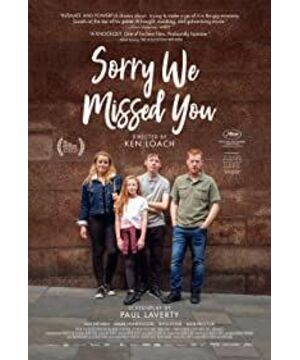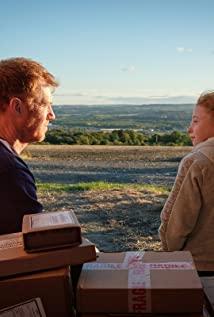This article was originally published in The Surging Thought Market
The 84-year-old British director Ken Roach continues his consistent theme and stand in his new film. To a large extent, the title is a confession to the neglected and harmed working class as a whole, affectionate but also implied a bit of helplessness. This is exactly the motif of the director's repeated variations in his 56-year career: how can the working class defend their dignity in the face of the unsustainability of work and life. Although it is unbelievable, it is hard to imagine that there is another director today who is willing to work tirelessly and meticulously at this huge but unspeakable group for decades. After being repeatedly obstructed by political censorship and banned works in the 1970s and 1980s, Ken Roach still did not compromise and give up. Even now, age has not hindered the director's attention to the latest developments in workers' lives and rights.
In this new film that must not be missed, we can not only see the director’s portrayal of the three generations of labor witnessed in person, but also how the traditional labor rights and interests under the platform capitalist employment environment are further destroyed, thus making working-class families more serious. More and more desperate.
Three Generations of Labor: A Covered History of the Decline of Labor Rights
Although the film focuses the narrative on the contradiction between the exploitation of workers by digital capital platforms and the maintenance of daily family life by workers, the display of contradictions does not lack the corresponding historical depth. The director actually showed the differences between the three generations of labor created by different eras.
The first to enter our line of sight is the protagonist's family. Ricky and Abbie, as the 1980s in their prime of life, are the source of family income. Before the economic crisis, they lived a quasi-middle-class working family life, borrowing a house and a car. But the bankruptcy of the bank during the 2008 financial crisis caused them to eventually lose their house. Husband Ricky also lost his job in the construction industry and became a "self-employee" under the Internet express platform. His wife Abbie is a home care worker on the Internet platform. Facing the exploitation of the gig economy, they lack traditional labor and social security, and more importantly, lack the corresponding solidarity organization, let alone struggle experience.
The children in the family are the adolescents born after 00. His elder brother Seb will enter society in a few years, but through the experience of the young people around him, he has clearly seen that there is no hope for his future, whether he is going to university or looking for a job, he will have no future. So he became a rebellious and angry young character, skipping classes frequently and indulging in street graffiti. My sister Lisa is much younger and has not yet entered the pressure of society. She is smart and considerate. She tries to take care of other members of the family, but she is unable to solve the family's tearing problem because the problem cannot be solved within the family. Like their parents, they fell into a helpless state at the end of the film. This is inevitable. In addition, compared with their parents, they are a generation that grew up under the environment of smartphones and wireless networks, and are more dependent on these new technologies.
Easily skipped are the 1950-1960 generations in the film. Through the perspective of Abbie's carers, this generation is presented as aging elderly people who need to be cared for. Although the film vividly portrays them having mobility problems and frustrated self-esteem due to aging, don't neglect the more important information to convey. First, an old man with a strange temper deliberately knocked over the plate on the dining table, because Abbie rejected the old man’s kindness to comb her hair, and declared that he must abide by the platform’s rules and should not have a close personal relationship with “customers”. But the old man's plate throw was a turning point in Abbie's change of attitude. After that, she began to break the rules and deal with "customers". So there was a scene where Abbie shared family photos and stories with another old man. The film thus points out the burning years of this generation of labor experience. They are a generation of laborers who participated in the strikes in Britain in the 1970s and 1980s when they were young. When they face the photos of the past, they can recall the car filled with the picket of the strike, the restaurant that provided free food to the strikers, and the courage of the workers to fear the violence of the police with the enemy. However, today's workers face labor dilemmas (such as 996 or even more serious overtime hours and no overtime pay per day) but lack of ways to protect their rights. Therefore, the old people were very surprised when they heard about Abbie's labor situation. Their spirit of resistance was actually stronger than that of the younger generation represented by Abbie and Ricky. This situation is also possible in the last film "I am Blake". See. Here shows a very sharp contrast between the two generations.
When we look at the director’s experience in directing and the film together, we will find the director’s efforts to recall the class consciousness and struggle spirit in British history. In the 1980s, when Margaret Thatcher’s Conservative government came to power, it vigorously implemented a series of neoliberal reform measures, while controlling academic and media public opinion, while privatizing a large number of workers through the privatization of steel, railways, coal mines and other public sectors. , And strongly suppressed the struggle of union workers. At the same time, problems such as bureaucracy in the trade unions also make it difficult for the senior leaders of the trade union to make the most beneficial decisions on behalf of the workers. Ken Roach's documentary in this period "A Question of Leadership" ("A Question of Leadership", 1981) "Questions of Leadership-Problems of Democracy in Trade Unions: Some Views from the Frontline, 1983 ), "Where are you on? "(Which Side Are You On?, 1984) was subjected to severe political censorship and banning punishment for reflecting these problems. The reason for the ban is that these documentaries have lost the "neutrality" of the record. From this period of history, we have seen how the subject consciousness of the working class was blocked and forgotten. The state apparatus achieved its goals through violence and ideological means.
But the film does not lead to a completely desperate situation. In fact, there is always a fire of hope implied in depression. The plot progressed to the second half. After arguing with her husband and running away from home, Abbie sought comfort in the elderly's house. The scene in the film that symbolizes the spiritual transmission of the two generations is unforgettable: the old man combs Abbie's hair to relieve her mental pressure, while singing the popular song "Goodnight, Irene" by the American folk band The Weavers. You must know that this ballad helped weavers break into the ranks of popular music and let more people know about their other left-wing pro-labor works.
The film also pinned many hopes on the youngest generation after 00. To be fair, his brother Seb has excellent team organization skills, and his insight into fate and desire for freedom are reminiscent of the eagle-training boy Casper in Ken Roche's early work "The Kid and the Eagle". Sister Lisa showed her keen analytical and critical ability. While helping her father deliver the courier, she did a simple social analysis of the operating mechanism behind the code scanner of the courier company. She thought about what her father had never thought about: front-line couriers working with barcode scanners didn’t even have time to go to the bathroom, but those managers who sat in the office and manipulated these procedures never did so, and this is not the case. Fair.
Modern slavery: the challenge of labor rights protection
The focus of the film is to show how the gig economy destroys the working-class family life: long hours of work have caused two generations to lack time to communicate, gradually creating a gap; work encroaches on private life, and the relationship between husband and wife becomes tense; unsafe family and educational environment make The child has lost faith in the future. Although cutting into labor issues from the daily life and interpersonal relationships of communities and families has always been a feature of Ken Roach’s previous works, this narrative method is used in "I Am Blake", "Bread and Roses" and "Casey Going Home". It can be found, but the new film also shows in unprecedented detail how the working class is newly exploited under the neoliberal line of Internet technology.
We saw that the distressed couple in the family suffered all kinds of unfair treatment because they were not recognized by the digital capital platform as employees of the company. First of all, working hours are staggering, and there is no minimum wage and overtime pay. Ricky’s working mode is close to 796 (referring to the working mode of working from 7 am to 9 pm every day, 6 days a week), and his daily working hours are far more than 8 hours without interruption. Urinating in a plastic bottle. And Abbie's working hours will never be lower, and there are more uncertainties: the platform may call her to pick up at any time-this is what we witnessed at the interrupted family dinner. And this violated her private life. Second, many of the production costs borne by the company in the past are now passed on to the digital workers on the platform. Ricky bought the express truck at his own expense and had to bear the fuel and maintenance costs. Abbie has to pay for the bus fare to and from different employers at work.
We can further see the "strength dumping" of digital platforms. When Ricky was robbed and beaten on the way to work, the platform was unwilling to admit this type of textbook-level "work-related injury". There was no work-related injury insurance and medical expenses were paid by himself. Not only that, but he was also required to compensate for the lost passport and the damaged code scanner in the package he was transporting-which was expensive. In addition, during his "absenteeism" days, he will face high fines every day. He has been repeatedly told that he is "self-employed". It is incredible. If the digital platform does not recognize Ricky as an employee of the platform and is unwilling to bear the social security of the workers, how can he be fined for absenteeism?
What is even more frightening is that the combination of hard rules and regulations and soft human relationships constitutes firm personal control over workers. The company will not "order" Ricky to work hard and not take vacations. But once Ricky takes a vacation, apart from the high fine, he is no longer a "good boy" in the eyes of the manager. This makes Ricky feel that he has failed the expectations of the manager and the client. When Ricky had to "skip" two days in a row due to the difficulties his son encountered, think about how he bowed to the manager on the phone. He felt self-blame and guilty for his "dereliction of duty", but he never thought that the digital platform had never fulfilled his responsibilities to the employees. On the contrary, they have been evasive, and have assumed a hypocritical equal posture in a high-sounding language: "You are a self-employed person. You are not only responsible to your partners, but more importantly to yourself." This kind of moral kidnapping made Ricky completely forget that vacations are the rights of workers. A similar thing happened in Abbie. The platform took advantage of her kindness to the elderly and made her pay free and extra labor. For Abbie, this kind of labor is more like voluntary, and this is exactly what the digital platform intends.
Similarly, the “self-employed” identity that was instilled into workers, through layered subcontracting (packaging areas or routes) also separates the workers, so that they can form a more intense competitive relationship. Weakened the possibility of unity-although Ricky is more often presented as a victimized worker who has worked very hard but still fails to meet demanding standards, his behavior of "taking away" the line of colleagues for more salaries is indeed typical." The thief" as. It is more difficult for traditional trade union organizations to enter such a place.
In addition, we can also see that the rules of the express platform prompt Ricky to violate the traffic law, causing safety issues such as fatigue driving. In January 2018, Don Lane, a diabetic courier in Dorset, England, passed away after missing a medical consultation. At that time, in order to avoid a daily fine of 150 pounds, he chose to continue to work and did not seek medical treatment. Ken Lodge and the film's screenwriter Paul Laverty (Paul Laverty) made the movie based on this story. Everything is so real. Finally, the film also reminds us: the personal surveillance of workers by location tracking technology and the collection of personal data privacy of customers and the exchange of benefits with other companies are also issues that cannot be ignored.
We must realize that the trend of flexibilization (such as labor dispatch, hiring temporary workers) and decentralization (multitasking and multiple paralleling) of capital companies has actually become more and more obvious since the transfer of jobs to the emerging service industry. But the emergence of Internet digital platforms has intensified this process. As shown in the film, platform capitalism does not recognize the employment relationship, so that labor-management contradictions do not apply to the traditional labor law system, so as to get rid of a series of risks and responsibilities tied to this, and reduce "labor costs." This signifies that the achievements of labor historical struggles fixed in the form of statutory law have been completely denied.
There are not a few laborers facing these severe challenges. According to the Guardian report , in the period 2016-2019, the number of UK digital platform working capital doubled to 4.7 million, accounting for almost one-tenth of all in employment. There are currently as many as 10 million people in the UK engaged in some kind of unstable work. This trend has gone far beyond what is generally considered to be a "gig economy" field and has entered traditional occupations that have been hundreds of years old, such as teaching, nursing and hospitality services. . According to the National Express Practitioners Occupation Survey Report 2019 released by China Post Express , the number of couriers in China has exceeded 3 million in 2018, of which 46.85% work 8-10 hours a day, and 10-12 work a day. Hours accounted for 33.69%, and nearly 20% of couriers worked for more than 12 hours. Due to the irregular work system, the couriers have no overtime pay, and most of them can't talk about the five insurances and one housing fund. 75.07% of couriers earn less than 5000 yuan a month.
These trends have indeed made union organization more difficult. In the 1970s, half of British workers held a union card, but now only one in five. Among the majority of young people working in the rapidly growing private sector, this number has dropped to 6%. In 2017, the number of strikes in the UK was the lowest on record. The total number of strike days was only 170,000, compared with 29.5 million in 1979, known as the “Winter of Dissatisfaction” in the UK. What we usually call the three rights of labor (the right to organize and join a trade union (the right to solidarity), the right to collective bargaining (the right to dispute), and the right to collective action (the right to resist)) are being lost under the new form of capital exploitation.
In the end, did the film fall into the stereotype of the left-wing "technological conservatism" that opposes the application of emerging technologies? Obviously not. It tries to make us see that the constant weakening of labor rights has continued since the 1970s. This is also the starting point for this article to put this point of view in the first part. As Dallas Smiley wrote in "What's After the Bike?" "As mentioned in ", technology does not exist independently, research and development and application of technology is a political process. Today we are in the neoliberal line of Internet technology, which has caused serious problems. Therefore, the key is that we need alternative technical and cultural practices outside of capitalism.
Alternative options: gig trade unions and platform corporatism
In reality, what we call alternative practice is not absent.
In fact, new gig unions are being formed, although not smoothly. In 2012, the Independant Workers of the Great Britian (IWGB) was established to serve workers in the gig economy. According to The Guardian reported that , since 2012, including the British Federation of Trade Unions (GMB) and IWGB including union won a series of cases against employers of part-time economy. In 2018, the British Employment Tribunal ruled that the self-employed Hermes couriers who appealed were actually workers with basic employment rights (such as minimum wage and holiday wages), rather than independent contractors. Since then, the court has made similar judgments against Uber, Addison Lee, City Sprint, Excel and e-Courier. But this did not lead to a major change in the industry, because the company has not yet applied court rulings to workers outside the scope of the case, and court rulings have been repeatedly challenged. Uber is currently appealing a ruling granting drivers basic driving rights, which will be made this year.
Where there is no time to form a union, the wildcat strike is ongoing. On August 27, 2019, Rideshare drivers gathered to protest outside Uber's headquarters in San Francisco, California. On September 10, California senators voted to pass a bill prohibiting companies from incorrectly classifying workers as independent contractors.
Some techniques are very cleverly applied to the struggle. Whatsapp provides the technical foundation for the network of couriers and delivery workers. The news spread quickly. In addition, using the platform's programming structure, some situations conducive to strikes have also been established. In 2016, Deliveroo announced that it would unilaterally change the payment plan for riders, which triggered a six-day "strike". The riders quickly took collective action to prevent them from taking orders. Courier colleagues from Deliveroo's competitor Uber Eats quickly followed suit and began to take advantage of the promotional offer in the app: a £5 discount for the first order of new customers. By repeatedly creating new accounts and ordering cheap meals to be delivered to the pickets, the strikers accumulated a large amount of free food, and it was Uber who paid for it. At the same time, when a steady stream of riders came with food, they found that their customers were all colleagues and were cheering and asking them to log out of their platform accounts to join the strike.
In response to the drawbacks of platform capitalism, an alternative to platform cooperativism was also proposed by Trebor Scholz, a scholar from the New School in New York in 2014. Through the integration of the cooperative model and digital platform technology, the digital platform is owned by the workers, and the workers can become the owners of the platform, enjoy decent wages and income security, participate in the decision-making of the division of labor, and have the right to determine the use and use of personal data on the platform. Survive. Over the years, we have seen many successful cases of operation, covering various industries such as freelance, online retail, creativity and art, taxi transportation, housekeeping, news media, and trading markets.
Fairmondo in Germany is a discrete online market owned by users and adopts a cooperative model different from Amazon and Taobao. Its 2,000 members are committed to developing a platform to replace the big players in e-commerce, while sticking to their own ideas. The website encourages companies to participate in fair trade and only purchase goods from businesses with a good reputation for social responsibility. In the process of promoting from Germany to the world, they hope that the platform will eventually be collectively owned by cooperatives in various places.
Stocksy is a photography stock photo cooperative. It belongs to the artists. The cooperative concept is based on profit sharing, and the artists who provide photos to the website jointly own the ownership of the website. Artists can apply to become members. Once they succeed, they will receive a 50% commission from the sale of pictures and a profit distribution at the end of the year.
The American Domestic Workers Platform Cooperative Alia is a platform developed by the American Domestic Workers Alliance. In most states in the United States, domestic workers are not subject to general labor laws and are not covered by labor laws. In this case, domestic workers actually lack social welfare protection. But with Alia, domestic workers have paid vacation and insurance through the cooperative’s dividends.
Back to the movie. At the end of the film, in order to avoid fines, father Ricky sits in the driver's seat with an unhealed work injury, and once again embarks on the endless express road. In the uncontrollable crying, we felt the deep helplessness and suffering in his heart. Fortunately, the growing development force of platform cooperativism can be counted as a positive response to the dilemma of Ken Roach's new film. 2020 is designated as the Year of Platform Cooperatives by The Platform Cooperativism Consortium (PCC). We look forward to more workers investing in the ranks of changing their own destiny and exploring more alternative routes to replace unfair economic models.
View more about Sorry We Missed You reviews










